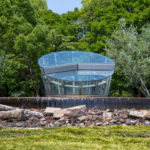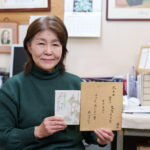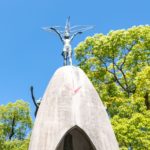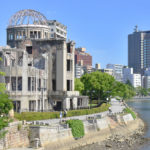This Cannot Fade Away and Disappear Also…
To Preserve the Feelings and Experiences of Atomic Bomb Victims for Posterity
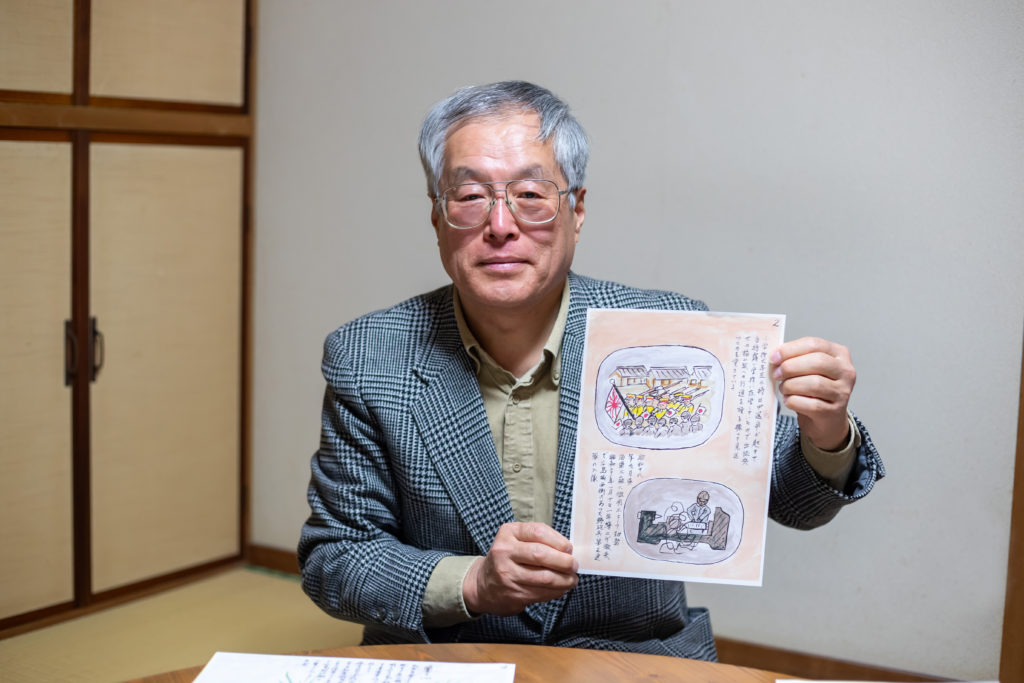
When the atomic bomb was dropped, IKEJIRI Hiroshi (passed away in April 2023 at the age of 97) was on Mt. Futaba, which is roughly 3km away from the hypocenter of the blast. He had been giving kamishibai (storytelling with illustrated boards) performances at elementary schools, junior high schools, and other facilities in Fukuyama city using picture cards he created based on his own experiences, but he decided to withdraw from this activity in 2021 due to his old age and concerns about COVID-19. At that time, UEOKA Shinji, Director of the Fukuyama City Atomic Bomb Survivors’ Supporters’ Association who had been assisting Mr. Ikejiri with his performances, stepped up to continue giving theses performances.
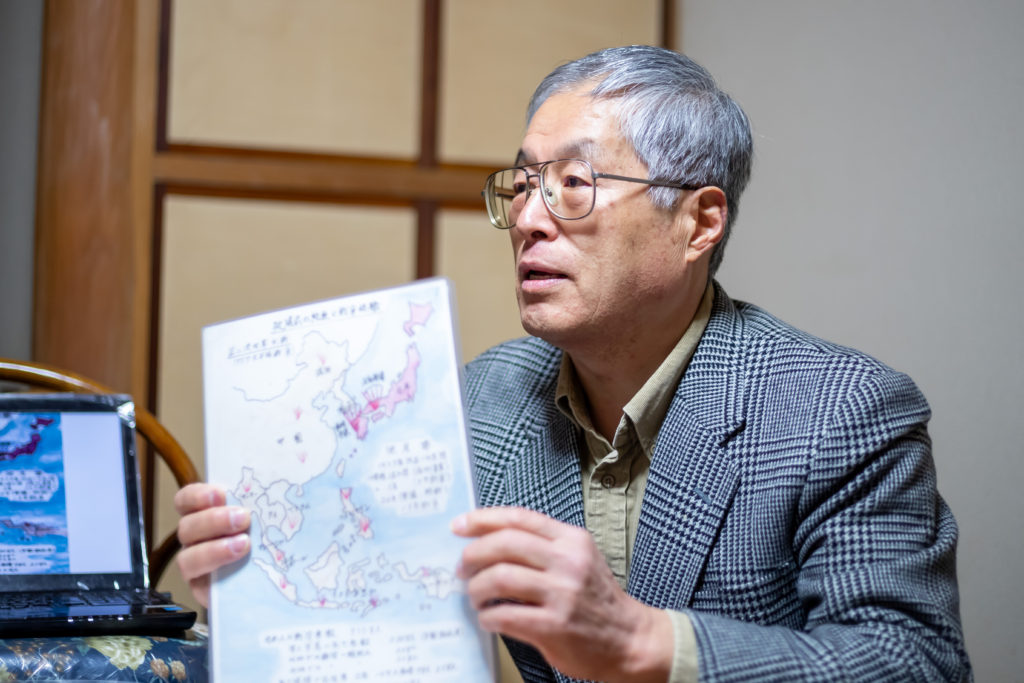
Mr. Ueoka inherited Mr. Ikejiri’s picture cards and continued his storytelling activities
The Fukuyama City Atomic Bomb Survivors’ Supporters’ Association was inaugurated in 2015 following the dissolution of its predecessor, the Fukuyama City Atomic Bomb Survivors’ Association. It currently has 52 members, of which 17 experienced the atomic bombing. Mr. Ueoka and other second-generation survivors play a key role in the association’s activities.
Mr. Ueoka came to attend this association’s meetings while accompanying his mother Atsuko, and this is how he met Mr. Ikejiri. With the extra time that he found in his schedule after reaching the compulsory retirement age, he began to help the association and Mr. Ikejiri, such as by taking him to and from his performances. It may have been a natural transition for Mr. Ikejiri to count on Mr. Ueoka as his successor.
“Although I have not been trained as a storyteller, when Mr. Ikejiri asked me, ‘Would you do this on my behalf because this cannot fade away and disappear also?’ I decided to do this for him since I had his picture cards and scripts.”
Having inherited all of the resources that Mr. Ikejiri used for his performances, Mr. Ueoka took the illustrations that were drawn on roughly A4 size sheets of paper and imported them into his computer, allowing him to incorporate a new technique of displaying the picture cards through a projector so that they could be easily seen in large venues also. Another idea that he has added to give listeners a better sense of the actual circumstances is to present the Atomic Bomb Survivor’s Health Handbook of his mother Atsuko, who was 13 years old at the time of the bombing, while sharing her anecdotes.
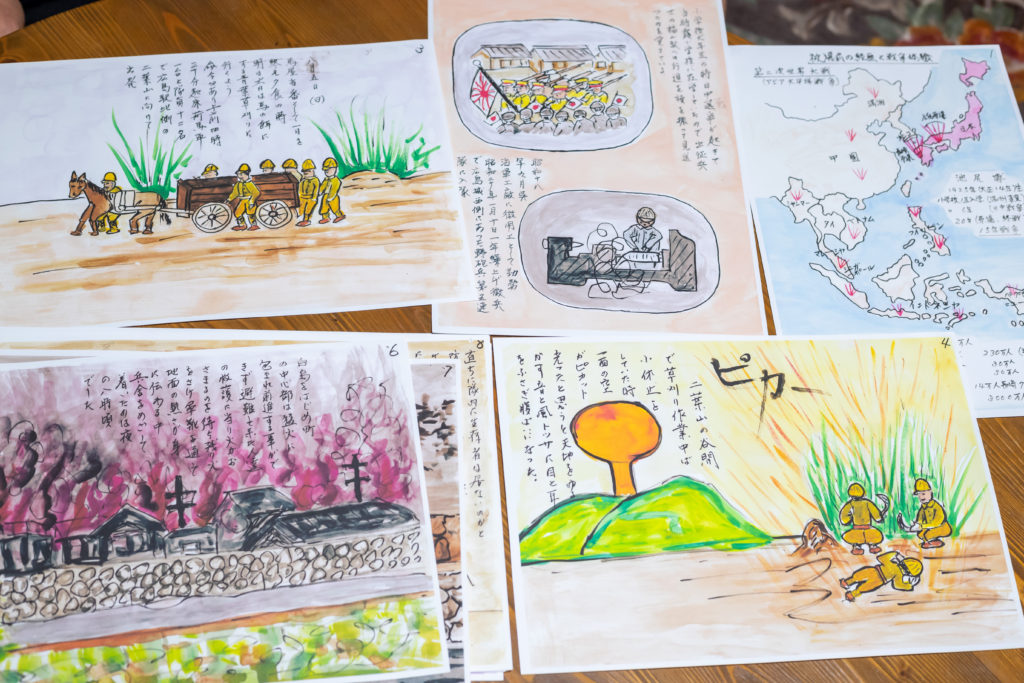
The hand-drawn picture cards have been maintained carefully and retain the vividness from when they were drawn
There has been a recent increase in events that painfully remind us that war is certainly not a thing of the past, as scenes from the wars in Ukraine and Israel are broadcast on TV. These storytelling efforts also serve as a reminder of how the horrors and misery of war affect each and every one of us.
“When he performed at elementary schools, Mr. Ikejiri used to ask, ‘How do you think the situation was for students who were attending the same elementary school, which was known as a national school back then, as you?’ All of the children would listen very intently as he would say, ‘When the bomb was dropped on August 6th, about 1,760 elementary school students from 13 different schools were participating in building demolition activities to prevent the spread of fires caused by firebombs and about 1,255 or roughly 70% of them were killed by the bomb.’”
In addition to these storytelling activities, the Supporters’ Association also continues to engage in other efforts to preserve valuable resources for posterity, such as by compiling the Atomic Bomb Survivors’ Association Bulletins that Mr. Ikejiri had always kept into a book and donating it to the Fukuyama and Hiroshima city libraries, Hiroshima Peace Memorial Museum, and Hiroshima National Peace Memorial Hall.
As we approach 79 years since the atomic bombing, not only are the survivors continuing to age, so are their children who represent second-generation survivors. As a result, it is becoming ever more challenging to pass on memories from the bombing in an effort to achieve lasting peace. The number of survivor organizations that cannot avoid dissolution due to a lack of successors is not insignificant.
“I imagine that every organization has concerns about what to do moving forward. The same is true of our organization. The reality is that most second-generation survivors have not heard about the atomic bombing. In fact, the first time my mother told me her stories was two or three years before she passed. I believe survivors do not want to recall their miserable past, and there was even discrimination against them in the past that would prevent them from talking about their experiences. With that said, the experiences and wisdom of all of the survivors must be kept for posterity. What will happen to Mr. Ikejiri’s illustrations and scripts when I pass away? When valuable resources are kept by individuals, there is a high likelihood that they end up being lost. Since I am still engaging in activities with the Supporters’ Association, I do not plan to let go of these documents just yet, but I believe that I will eventually need to donate them to somebody who is willing to preserve them into the future.”
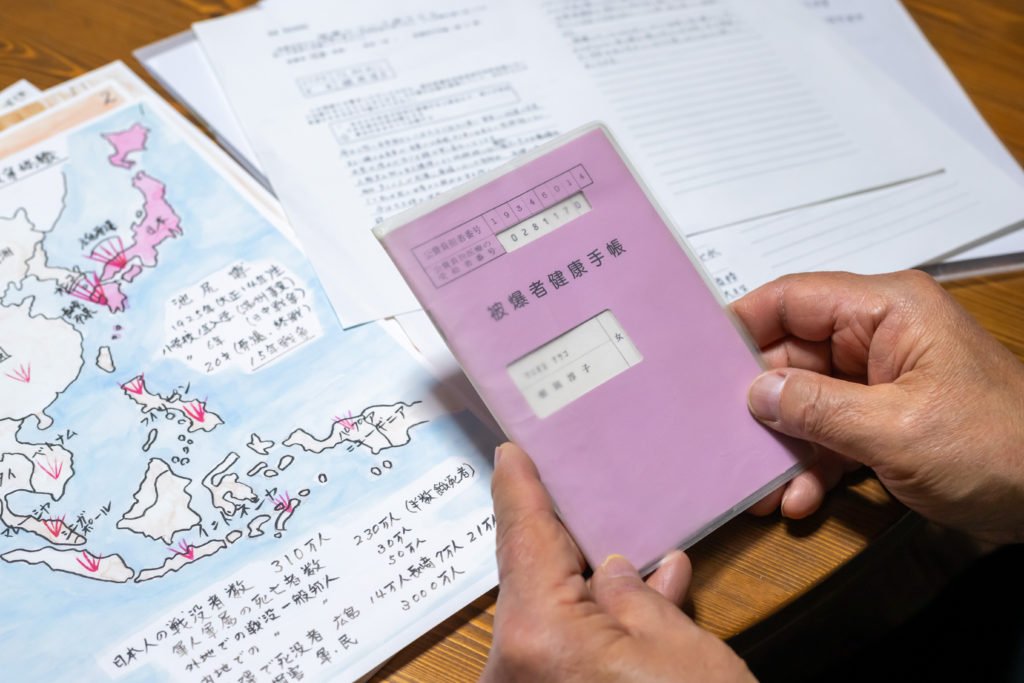
His mother Atsuko’s Atomic Bomb Survivor’s Health Handbook has detailed records on the way things were at the time of the bombing, as well as the examinations and tests that she underwent
Although there is a sense of danger that memories of the atomic bombing will be lost forever, every reasonable person should believe that war is unacceptable and wish to build a world where there is no war. However, we still seem far away from the day when there is no war on earth. Is there anything we can do to achieve world peace?
“It is not acceptable to rely on military force to resolve issues, and I believe that everybody understands this… That is what makes this difficult. I think it would be good to foster peace by making people aware of the past and the present and changing the way they think so that they firmly believe, ‘It is unacceptable to do things like this.’ That is all that we can do, right?”
What we can do as individuals may be something as insignificant as sowing seeds and watering them carefully. However, the act of steadily and diligently carrying out these actions will probably not be in vain.
Fukuyama City Atomic Bomb Survivors’ Supporters’ Association Office
Email Address: shinsatonorihiro@outlook.jp
1-11-23 Mikadocho, Fukuyama 720-0805
Tags associated with this article



